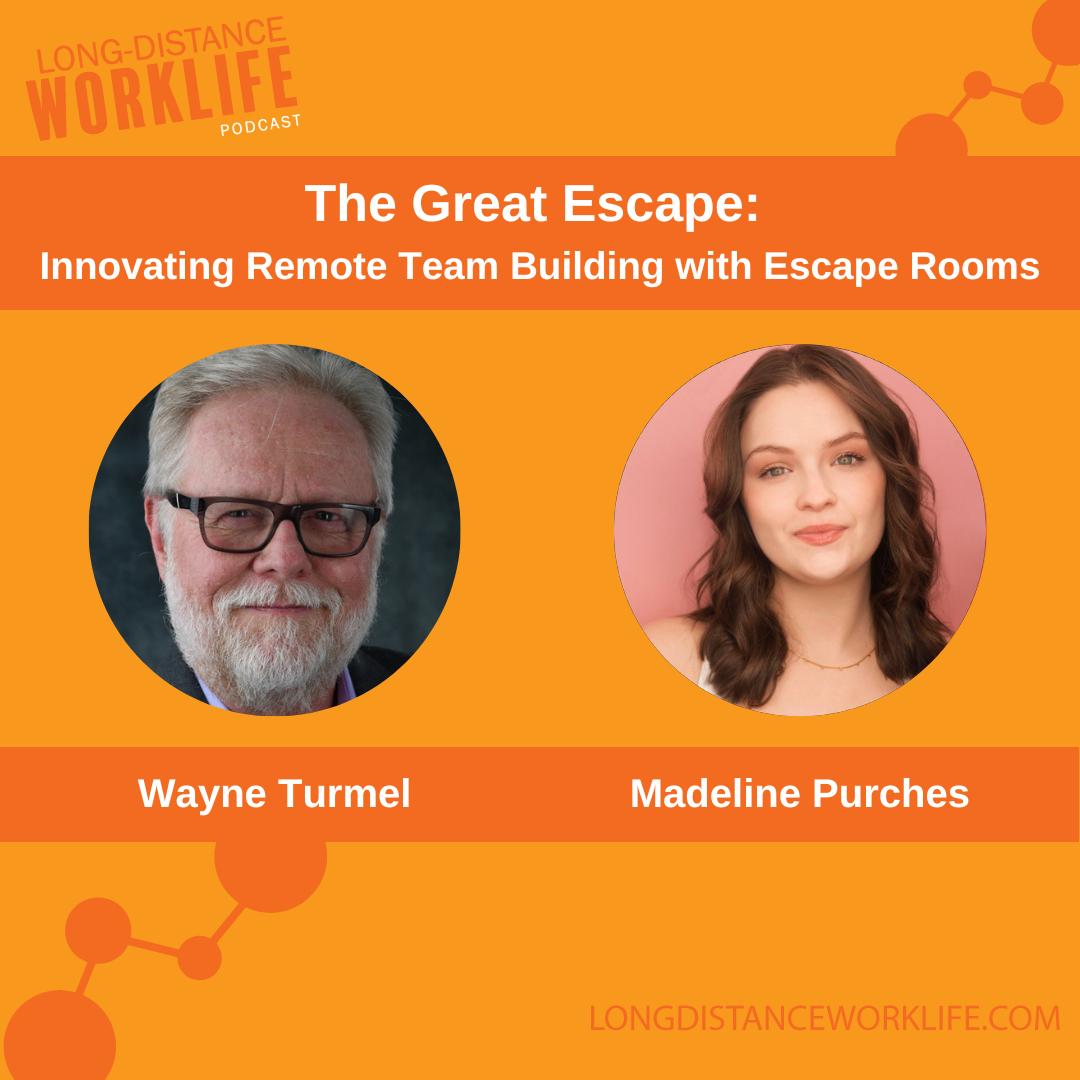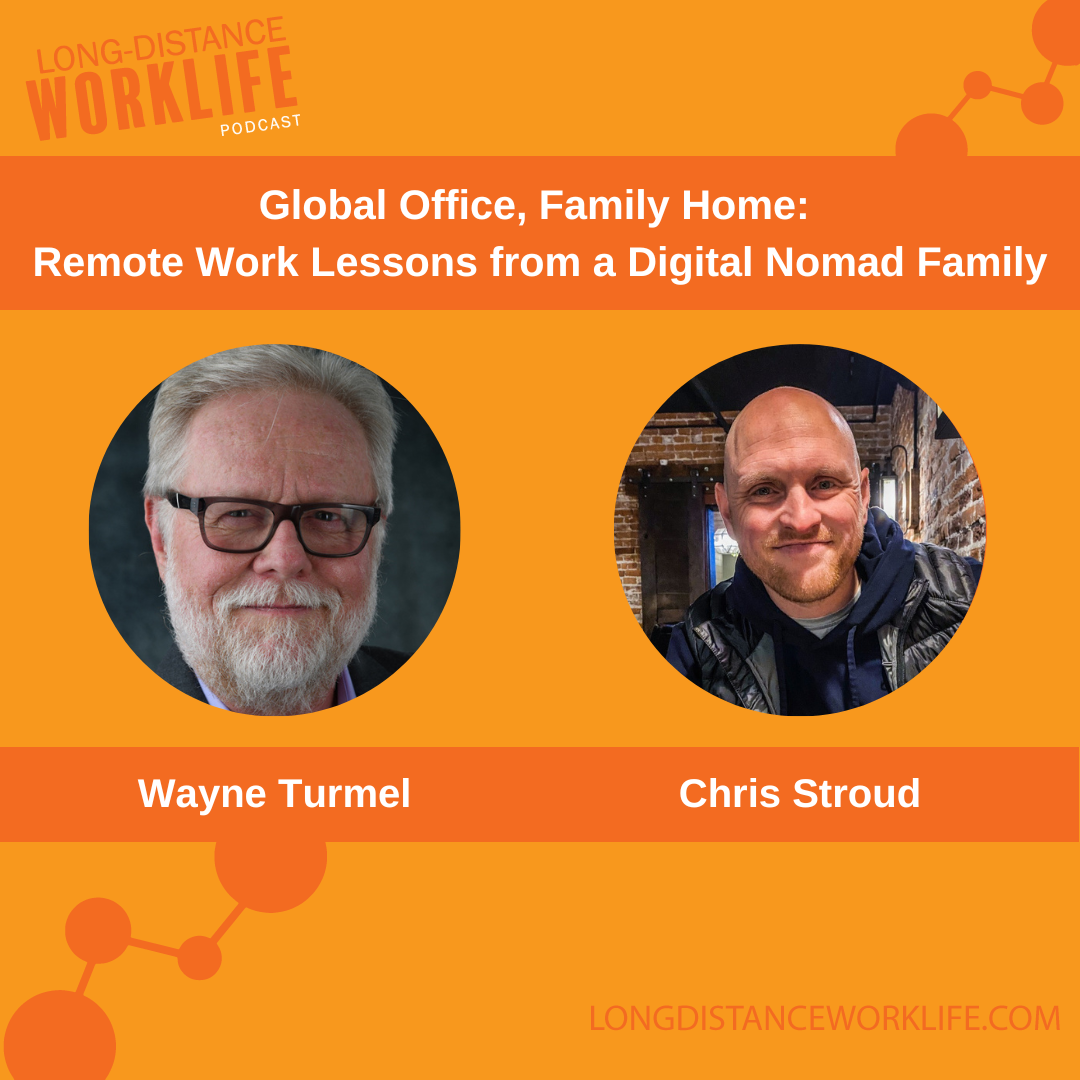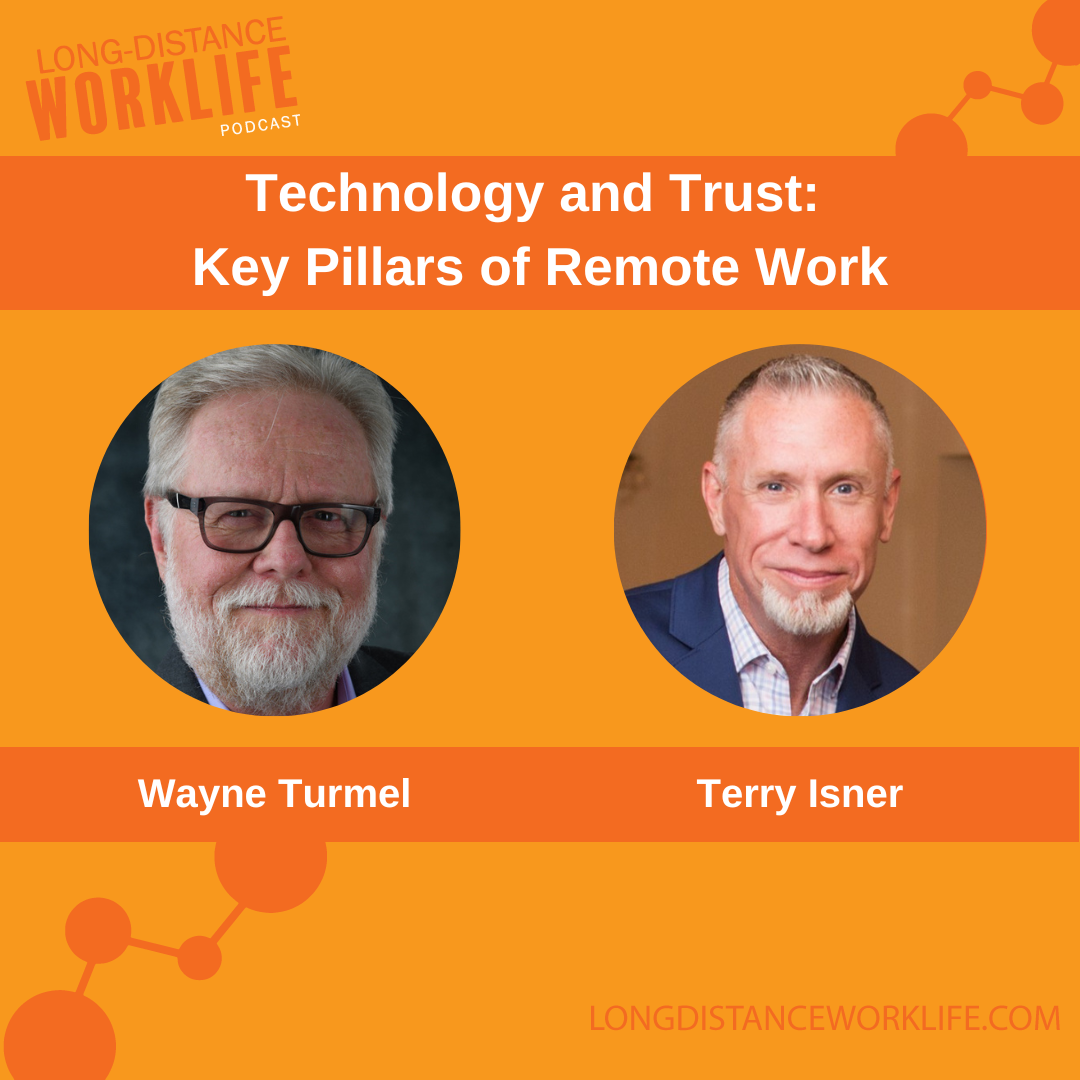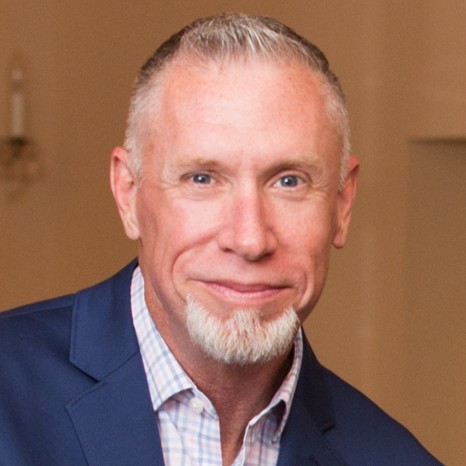Wayne Turmel joins Madeline Purches from The Escape Game to discuss the world of remote team building. Discover how the principles of escape rooms can transform the dynamics of remote teams. Madeline shares insights on adapting escape room tactics for virtual environments, tackling cultural and technological challenges, and creating engaging, inclusive activities for global teams. Whether you're leading a remote team or looking for innovative team-building strategies, this episode is packed with practical tips and fascinating perspectives.
Key Takeaways
1. Adapt to Change: Embrace innovative solutions for remote team building, like virtual escape rooms.
2. Cultural Sensitivity: Be aware of cultural references in team activities to ensure inclusivity.
3. Tech Accessibility: Ensure activities are accessible for all tech skill levels.
4. Foster Competition: Use competitive elements to engage and motivate team members.
5. Communication is Key: Maintain open, frequent communication channels for remote team members.
6. Level the Playing Field: In hybrid settings, ensure remote workers feel equally involved.
7. Create Connection: Intentionally develop opportunities for team members to connect beyond work.
Featured Guest

Name: Madeline Purches
What She Does: Manager of Corporate Sales for The Escape Game
00;00;08;03 - 00;00;43;28
Wayne Turmel
Hello, everybody. Greetings. Welcome once again to the Long-Distance Worklife podcast. The show for those who are working remotely, working hybrid, working remotely some of the time, just trying to make sense of the way that we work today. My name is Wayne Turmel. I'm your humble servant. We are very excited today. This is a guest episode. I've decided to stop calling them Marisa-less episodes because people love Marisa, rightly so.
00;00;43;28 - 00;01;16;01
Wayne Turmel
And I don't want to diminish expectations. We are blessed with another very, very charming, talented, very smart guest, Madeline Purches and we are going to be talking about team building and icebreakers and activities and all the stuff that you know, makes me a little bit grumpy. But I understand the importance of it. So we are going to welcome Madeline Purches in the show, Madeline.
00;01;16;08 - 00;01;18;16
Madeline Purches
Hey, Wayne, great to be here.
00;01;18;18 - 00;01;32;29
Wayne Turmel
Well, in the words of David Letterman, we'll put a stop to that. So welcome. Tell us a little bit about you and The Escape Game and then we'll jump into our conversation here.
00;01;33;01 - 00;01;49;20
Madeline Purches
Yeah, absolutely. So I'll start with The Escape Game. They're a little bit bigger than I am. They are one of the largest privately owned escape room companies in the U.S. We're currently sitting at 35 physical escape room locations. And if you've never played an escape room before, we're going to lock you in a small room and make you complete puzzles until you get out.
00;01;49;20 - 00;02;10;08
Madeline Purches
It's a lot of fun. Despite what it sounds like. We have sort of shifted our business model to include more and more corporate groups, especially since 2020, when there was obviously a huge need for some team building remotely and we were able to sort of shift some of our games and products to make them work remotely, which I'm sure we'll talk about.
00;02;10;10 - 00;02;14;21
Madeline Purches
And I am the manager of the sales team for those groups.
00;02;14;23 - 00;02;33;21
Wayne Turmel
Well, that's actually was the intriguing thing and why we were having this conversation, because I'm familiar with escape rooms. I've never done them, but I get the concept right now. I have friends who who are addicted to them and other friends who actually I don't know if you call them Dungeon Masters, but you know, they run.
00;02;33;28 - 00;02;35;23
Madeline Purches
Yeah, yeah, yeah. Gotcha.
00;02;35;25 - 00;03;00;19
Wayne Turmel
So when I first got the query about you coming to talk to us, I went, Well, that's nice, but, you know, little hard to lock somebody in a room from across the country. So tell me a little bit about the shift, because I think a lot of people's business model took a beating in 2020. So tell us about that shift to remote.
00;03;00;23 - 00;03;09;21
Wayne Turmel
What what we know, what inspired it, but what kinds of things did you have to take into account that maybe surprised you?
00;03;09;23 - 00;03;32;08
Madeline Purches
Yeah, absolutely. This is something I really have to commend our team for, because they they saw it coming down the pike and knew very clearly that this was going to impact our business uniquely because, you know, not only were we affected by shutdowns, but we would have a harder time coming back. The games are so tactile. They literally involve, by their nature, people being in small rooms, locked in together.
00;03;32;08 - 00;03;54;12
Madeline Purches
So they knew we needed an alternative solution. And so the first version was literally sticking a camera on a helmet on somebody's head, putting them in the room and hopping them on a zoom call and seeing if it worked. It was very Blair Witch Project at the beginning. It was not the biggest success, but we tinkered and tailored until it became something that has become very accessible for remote teams.
00;03;54;12 - 00;04;13;24
Madeline Purches
And we have, through the use of both the person in the room who's got a camera on their head and some very intense training to not be bopping around like crazy, a digital dashboard on the internet that they can access. It's got an inventory and scans of the room and all sorts of things. We're able to create something that has multiple different points of interactivity.
00;04;13;24 - 00;04;24;00
Madeline Purches
And while, no, you're not locked in a room, you do feel very immersed in the experience and really as close to the real thing as we can get you, which is the main goal from our perspective.
00;04;24;01 - 00;04;39;13
Wayne Turmel
And what was what was the reaction from people when you started telling them, Hey, we can do this virtually? What kind of went through people's brains and what kind of objections did you hear about this?
00;04;39;17 - 00;05;06;29
Madeline Purches
It was very similar to you. There was a lot of skepticism. A lot of there was both skepticism towards the whole idea of virtual team building, which I think is a whole other matter, but more specifically towards how the heck can you do something so specific, like escape rooms virtually? And we we ended up doing a lot of demos, a lot of discounted and free games just to get people in the door, lots of videos to explain and show and say, No, this is viable, It is fun.
00;05;07;06 - 00;05;24;20
Madeline Purches
It's really exciting. And then somewhere around June, July of that year, I think there was sort of a cultural shift where people realized that unfortunately, we're not getting out of this anytime soon. We're not going to be able to just get by with our weekly digital happy hours. And people were getting pretty sick of the virtual happy hours.
00;05;24;20 - 00;05;39;07
Madeline Purches
So it became clear we need another solution. And so it just really started blowing up at that point because we'd proven our track record that it was quality, It was a lot of fun. And then we had also gotten to a place in the culture. People were looking for it.
00;05;39;10 - 00;05;50;03
Wayne Turmel
Well, what makes for a good game when you are scattered around the world? I mean, how do you know that? Yeah, this one works.
00;05;50;06 - 00;06;08;02
Madeline Purches
Great question. You say around the world doing it for a global team as a specific challenge. So if you're doing something for a global team, you want something where a language barrier is not going to be a big barrier. Most people speak and read English, but you want to make sure that you're not. It's very easy to create.
00;06;08;02 - 00;06;19;29
Madeline Purches
I live in America. It's very easy to create a game or an activity that is specific to American culture or even Western culture. And so that's something you have to keep in mind. You want something that's going to be broadly applicable to groups. You also.
00;06;20;06 - 00;06;42;11
Wayne Turmel
Let me stop you there, because this is an important thing, because we are blind to it. We don't realize the kind of cultural things, whether it's football references or TV commercials or whatever it is. What kinds of things do you need to be cognizant of internationally?
00;06;42;14 - 00;06;58;24
Madeline Purches
Yeah, great question. Creating something. So there's two versions of it. One is for the group that is very fluent in English, and that's not really the barrier. The barrier is the cultural knowledge, and the other is for the groups that really, if they had their druthers, they would not be doing this in English, they'd be doing this in Spanish or similar.
00;06;58;27 - 00;07;20;20
Madeline Purches
For those groups that are just lacking the cultural knowledge, it can be very insidious and difficult. We created an entire game show product that is a ton of fun, really exciting, really high energy. But the problem is one of the biggest rounds in the game was focused around guessing common idioms and phrases from picture puzzles. And we very quickly realized, like the international groups can't do this.
00;07;20;27 - 00;07;43;28
Madeline Purches
Even the groups that are based in England or Ireland or English speaking countries really can't do it because they're all American phrases. And we don't realize it because most of the time we're talking to Americans. And so people know what you mean when you say something a dime a dozen. But people in Singapore did not. So that was a great example of us learning very quickly, like, it's not as simple as just simple language applicable to groups.
00;07;43;29 - 00;07;50;28
Madeline Purches
You have to really think about what do they know about and what wouldn't they know about, and how can you make something that's broadly applicable.
00;07;51;04 - 00;08;00;18
Wayne Turmel
That's great. I love flagging that kind of thing because so often and it's insidious, it can actually damage teams.
00;08;00;20 - 00;08;20;18
Madeline Purches
Yeah, it can. Because if you're jumping into a team building, I mean, there is nothing worse not only than then not being able to participate, but they probably plan this team building because they wanted to bring the global groups groups together. And so there's nothing worse than you can do than having your ten American participants just steamrolling the others because they can't participate at all.
00;08;20;18 - 00;08;38;07
Madeline Purches
So it's just it's a real bummer when that happens. So we really try to focus on ways to keep that from happening and to create products and games and activities that are going to be fun for everybody and won't make anybody feel like they're the odd one out, which is actually interestingly enough, we don't do any trivia for that reason.
00;08;38;07 - 00;08;57;17
Madeline Purches
Trivia is very popular and we often have people that will come to us and say, we want to do a virtual team building. We were thinking trivia or something similar. Trivia is just about the worst thing you can do because it's pretty impossible to pick a category that everybody is going to have some knowledge on. Inevitably, you're going to pick a category and a bunch of people are going to go, Well, I don't watch a lot of TV.
00;08;57;19 - 00;09;14;19
Madeline Purches
I can't really play. I'm going to sit back and I'm going to answer my emails because it's so easy to do if you're doing something virtually, just go, I'm just going to do my emails instead. We don't want that. Trivia is not a great fit for virtual team building specifically because it's really hard to make it applicable to everybody.
00;09;14;22 - 00;09;26;07
Wayne Turmel
So let's just with so we know what doesn't work. And by the way, as somebody who yes, it's been 30 years, but I was on Jeopardy and I'm a trivia freak.
00;09;26;09 - 00;09;31;05
Madeline Purches
Oh my- I mean, I love trivia, too. I'm about to be a fan, but. Yeah, but.
00;09;31;05 - 00;09;53;05
Wayne Turmel
Don't be impressed. Do you have the face, Everybody has. When you say you were on Jeopardy, and then you have to explain that you got stomped like a bug in international in humiliating. man, that's that's it. But, you know, trivia is kind of the kind of thing that I would go for, right? So that's a good idea.
00;09;53;05 - 00;10;03;26
Wayne Turmel
So let's what works and what doesn't work like very specifically descriptively, what kind of things work? Let's assume a fairly homogenous team.
00;10;03;28 - 00;10;23;28
Madeline Purches
Yeah. Things that work are games that are not going to be too technologically difficult because if you're working with a team, a wide variety of folks, a wide variety of ages, a wide variety of positions, even now, three years into the pandemic, well, post-pandemic, however you want to put it, we still have people that are not super tech savvy.
00;10;23;28 - 00;10;42;20
Madeline Purches
And so that's part of what makes the virtual escape room so good is that we have the Zoom call. We've got a person in the room, we have this whole digital dashboard that you can get as into or as not into as you want. If you are an engineer and you're super tech savvy, you can have two versions of the dashboard open and be looking at two different things at once and be checking the inventory and checking your list.
00;10;42;23 - 00;11;01;14
Madeline Purches
If you're not tech savvy, you could just open the zoom call and sit back and not have to click another thing and still participate. So creating an environment where people don't end up feeling stupid because they're not super good with technology is prerogative number one. That is a great way to make sure that people feel involved and feel like they're going to have a good time.
00;11;01;16 - 00;11;19;10
Madeline Purches
Number two is competition. People love competition and I think sometimes people who are planning these events shy away from it because they're like, Well, we're doing this to create unity in the team. We don't want to break them into teams and have them compete against each other. But most people are not, you know, drop down, drag out competitive people.
00;11;19;10 - 00;11;34;23
Madeline Purches
They like competition because it makes things interesting. But truthfully, what it's going to do is create a touchstone for people going forward. If you have a group that has never been together in person and they get together, they do a fun, competitive game and they're able on their next town hall to go, my gosh, did you see Annie?
00;11;34;23 - 00;11;52;11
Madeline Purches
She crushed our group. She was so good at that one round. That was incredible. That's awesome. And people will rib each other and they'll have their fun little my gosh, Team, you did so terribly. But that's a good thing. That's a great thing. That's giving them something to talk about. That's not work. And that is the most important thing when it comes to building culture.
00;11;52;11 - 00;12;06;13
Madeline Purches
So something competitive tends to be really good, something that doesn't have super high tech requirements. And then like we talked about earlier, something that's going to be broadly applicable to global teams, to teams of different ages and cultures, those are going to be the best fit.
00;12;06;13 - 00;12;31;00
Wayne Turmel
Groups that that those are really, really good guidelines. Tell me a little bit about when you've got like just physically how it works. If you've got people in the office as well as people who are remote, does it work best when everybody is at their own machine? Does it make sense to have people, you know, gather in the conference room, whatever?
00;12;31;02 - 00;12;34;28
Wayne Turmel
Just logistically, how does that work best?
00;12;35;00 - 00;13;04;09
Madeline Purches
Great question. So I myself, I'm going to go back a bit and then go forward. I myself actually work remotely. I work from home. My headquarters is in Nashville. My team is kind of spread to the wind, but I do occasionally have meetings or team building activities with my group in Nashville, and I tend to find and I think a lot of other remote workers feel this way, that nothing feels worse than being brought into a call, or everybody else is sitting around a conference room table and you're the only one on a screen because inevitably they're going to forget you're there.
00;13;04;09 - 00;13;27;22
Madeline Purches
They're not going to remember to talk to you. You're just going to kind of be shunted off to the sidelines. So my personal view, and this is not always feasible, but I always think if you're doing an event that is hybrid, meaning that you've got some people who are in a physical office and you've got some people that are joining completely remotely, I would prefer everyone to be on their own machine, even if that means they're in the office ten feet from each other on their own machine, because it's leveling the playing field for everybody.
00;13;27;24 - 00;13;44;11
Madeline Purches
It's making those remote workers feel like, okay, if they're coming to my space, we're all playing at the same level. We're all sitting at the table together. This is great. You can do it with people in a conference room. And in fact, we've done that before. I think if you're going to do that, it is better to say, okay, here are my people in person.
00;13;44;11 - 00;13;58;19
Madeline Purches
They're going to play on a team. Here are my remote participants, they're going to play on a team because again, what I found will happen is that if you've got those remote players on a team with people who are literally sitting around a table together, they're going to get forgotten. And that's the last thing that I want to have happen.
00;13;58;19 - 00;14;14;20
Madeline Purches
So leveling the playing field, trying to get everybody on their own machines, it may feel silly because it they may be sitting two feet from each other in a physical office, but it's going to be better for those remote participants. And truthfully, that's most of the reason we're doing this, is to get those remote participants involved.
00;14;14;23 - 00;14;38;15
Wayne Turmel
Well, this is great stuff and we will have links to The Escape Game and to Madeline's LinkedIn and all that good stuff on the page. So we will know if you're interested in more details. We can do that. Madeline, what you mention your own team is remote and I mean, obviously you guys specialize in team building and we don't.
00;14;38;17 - 00;14;42;25
Wayne Turmel
So I'm guessing it's not the worst place to work.
00;14;42;28 - 00;14;44;09
Madeline Purches
I hope not.
00;14;44;12 - 00;14;57;20
Wayne Turmel
What challenges you got even in an environment that you're in where, you know, people are self-selecting to work at a place like this? What are some of the challenges that you face with your team?
00;14;57;23 - 00;15;22;00
Madeline Purches
Yeah, great question. I am lucky that my team is small. I it's just me and two other people. So it's a very intimate team, which is great, but there are still definitely challenges that arise. Namely, both of them are most of the time based at our headquarters in Nashville, and I is their leader. I'm not with them. I am in a different place, which can be a big challenge because I, as my leader, want to be as present and available for them as possible.
00;15;22;00 - 00;15;42;06
Madeline Purches
And that can sometimes feel difficult when I am hundreds of miles away. Now, luckily we do sales, which is by its nature kind of an independent role, but there are definitely times when I want to be available as an asset for them and it's harder to do so. So some things that we have taken on as sort of tactics to make sure that everybody is taken care of.
00;15;42;08 - 00;16;02;20
Madeline Purches
We are religious about our use of Slack teams. Google Chat, whatever you use, I make sure that I am as available as I can be to my team whenever I can be. We have a time difference. So I while I'm not working 24 seven, if my team is online, I at the very least have my Slack open and I'm aware of it so that if they need me, I am there.
00;16;02;20 - 00;16;18;24
Madeline Purches
I want them to feel as accessible as I would be if I was literally at a desk right next to them. And of course, that's my perspective as a leader too. I would never want my my team members to feel like they need to be that accessible to me, but I want to be that accessible to them. The other thing that we do is we have stand up every single day.
00;16;18;24 - 00;16;36;10
Madeline Purches
Some days it is 2 minutes. We hop on, we say we're busy, we can't do this. We got to go. Some days it's like 45 minutes. We're 15 minutes of that is for actual work chat and then 30 minutes we just talk. And that to me is just as valuable as the actual down home work talk because it's about building culture and trust.
00;16;36;12 - 00;16;53;11
Madeline Purches
And as a leader, especially in sales, a role that can typically be kind of a little bit, you know, competitive and not trustworthy because you're competing for sales. I don't want it to feel that way. I want them to feel like they trust me. And then the last thing that we do, we will do bigger team building activities.
00;16;53;11 - 00;17;09;15
Madeline Purches
When I come into town, or sometimes virtually, but we do a monthly lunch and we actually I would highly suggest anyone try this because we just started doing it and it is a ton of fun. We'll do a monthly lunch where we each order lunch or go grab it and we'll sit at our desks with our videos on and we'll chat.
00;17;09;18 - 00;17;28;08
Madeline Purches
We started picking it through a spin the wheel thing where everyone puts in three suggestions and we have to spin the wheel to see what everybody gets. And it can be as simple as okay, it landed on Chinese food. That's what we're going to get. Or what happened last week, which is that one of my team members put “Text your mom, what you want for lunch” into it.
00;17;28;08 - 00;17;54;17
Madeline Purches
And moms got to pick what we were going to get for lunch, which was super funny and super cute and again, just created that relationship. Touchstone remote work is all about creating those opportunities for connection that would happen organically in an office, but I sometimes think that remote working has an advantage in that you are. If you're doing it well, you are focused intentionally on creating those moments rather than just trusting that they're going to happen.
00;17;54;19 - 00;17;59;21
Madeline Purches
So there is a little bit of a superpower in that. But I think I think constant connection and constant communication are the keys.
00;17;59;24 - 00;18;25;11
Wayne Turmel
Terrific. Thank you so much, Madeline Purches from The Escape Game. Thank you for joining us. I am going to remove you from our video screen for a moment while I let everybody else know that if you want links to Madeline and her work, they are at longdistanceworklife.com. If you enjoyed today's episode and I can't believe you didn't.
00;18;25;14 - 00;18;59;21
Wayne Turmel
Please please please like subscribe, tell your friends all of that good stuff. Our listenership is growing and not only is it growing, but you're a very engaged, active little audience. We love to hear from you. So please, you know, rollout to Marisa and myself and reach us on LinkedIn or you can email us and questions. Comments. Vicious personal attacks, pet peeves that you want us to talk about.
00;18;59;23 - 00;19;25;03
Wayne Turmel
Please, please, please stay in touch. We love that. Of course, if you are thinking about your team, should it be remote? Should it be hybrid? I urge you to check out Kevin Eikenberry and my new book, Long-Distance Team: Designing Your Team for Everyone's Success. You can find the book and downloadable resources and all kinds of great things at longdistanceteambook.com.
00;19;25;10 - 00;19;45;23
Wayne Turmel
We will be back next week with Marisa and I think a good pet peeve discussion. I think that's the topic so come check that out. Thank you so much for joining us. Check us out at the Kevin Eikenberry Group and we look forward to hearing from you soon. Don't let the weasels get you down. Have a great week.
Timestamps
00:00 Introduction to Madeline Purches and The Escape Game
01:49 Adapting Escape Rooms for Remote Team Building
03:00 Innovations in Virtual Escape Room Experiences
05:07 The Cultural Shift Towards Virtual Team Building
06:58 Challenges of Creating Culturally Inclusive Games
09:14 What Works and Doesn't in Virtual Team Building
11:01 The Importance of Competition and Connection in Remote Teams
13:27 Hybrid Work Environments and Remote Inclusion
15:22 Managing a Remote Sales Team: Strategies and Experiences
17:59 Concluding Thoughts and Episode Wrap-up
Related Episodes
Additional Resources
Order The Long-Distance Team
Remote leadership experts, Kevin Eikenberry and Wayne Turmel, help leaders navigate the new world of remote and hybrid teams to design the culture they desire for their teams and organizations in their new book!








